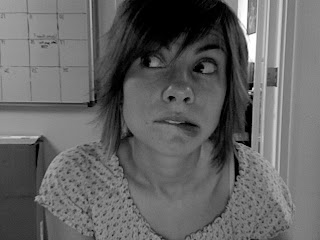
Title: A Clockwork Orange
Author: Anthony Burgess
Judgin' the Book By Its Cover: Does this cover depict a hellish world of pain and suffering? Check. Well, that's all you really need to know about the book.
Thoughts: Longsuffering friends, I feel I owe you a bit of a disclaimer here: I'm not sure adequate time has elapsed to for me to properly discuss this book. But I'm also not sure that enough time could EVER elapse for me to feel like I've got a handle on this thing. My first impression was that the book was, to quote page 14, "a bucket-load of beer-vomit". Maybe it happens, but I try to avoid it and pretend like it doesn't.
But let's dig in. The novel, like oh so many books, is set in a dystopian future. This particularly dark and terrifying London is terrorized by drug-using, violent teenagers (OK-- they're using weirder drugs and are WAY more violent than your run-of-the-mill Brit punks). Alex, our narrator, tells us firsthand in a strange quasi-Russian slang about his evil exploits. His tone is chatty, familial, and nonchalant as he describes the most awful crimes imaginable. Eventually, however, he is imprisoned and enrolled in a program that uses conditioned response to hyperviolent imagery to render him physically incapable of committing violence. From there the novel explores what happens when Alex can no longer choose his own actions.
Burgess' prose owes a formidable debt to James Joyce. Alex's punny, multilingual pseudo-slang rings with echos of Finnegans Wake, although Joyce never approached the visceral brutality of A Clockwork Orange. The first-person narration slowly becomes more accessible to the reader and opens up the world of the book in very realistic ways. On the other hand, the firsthand accounts of casual violence in this book were very hard to stomach, and is nearly impossible to set them aside when I try to review it if not objectively, then less subjectively. Granted, the book and the Kubrick adaptation certainly carry a lot of baggage with them, including the original exclusion of the last chapter in American copies of the book and the wave of copycat crimes that followed the release of the film in Britain. So questions of authorial responsibility and intent certainly apply to a book that has stirred up more controversy than perhaps any other in recent decades. The second half of the book is far more engaging than the first-- weighing the benefits of crime prevention against the dehumanization of indibiduals is much more interesting than simply peeping over Alex's shoulder as he murders an innocent victim.
When all is told, life is too short (and I have way, way, WAY too many unread books stacked all over my apartment) to spend time doing the literary equivalent of trudging through puddles of "beer-vomit" to get to any meaning. Although the book is certainly thought-provoking, I can't wholeheartedly recommend it. But I'm curious to hear others' reactions to the book. Anyone out there have an opinion?








